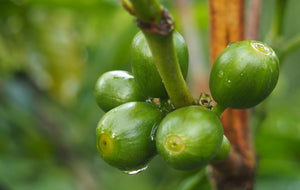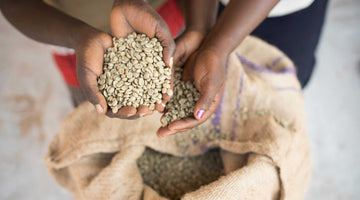About Coffee:
This natural Burundi comes from the women-owned producer group lead by Jeanine Niyonzima-Aroian in Ngozi Province with the name that has a deep meaning to her. Bavyeyi in Kirundi translates to “parents,’’ a name given in honor to the generations of hardworking parents, like Jeanine’s, whose labor in coffee provides shelter, nourishment, and educational opportunities to their children.
This coffee's flavor profile is rather unique for a natural coffee. Expect golden raisin notes with a pleasant velvety texture, along with the complexity of tamarind. Interestingly, tamarind is sometimes referred to as the “date of India.” It has a plump sweet and tangy flavor making a delicious cup of coffee to sip on.
On Chemex, this coffee shines with cranberry juiciness and velvety body but our favorite way to brew this coffee was Aeropress, as it presents a strong cherry liquor and highlights tamarind notes the best.

About the Producer:
Jeanine Niyonzima-Aroian, the founder of JNP Coffee, is without a doubt one of the most influential individuals in Burundi coffee today. Supporting her coffee knowledge with a Q Grader license and MBA from Kellogg School of Management at Northwestern University, as well as working for 20+ years internationally, she reconnected with her birth country by founding Burundi Friends International. BFI is a 13 year old non-profit that funds educational and economic empowerment programs for rural Burundians.
Through working with Burundi coffee, she realized she had every reason to lead the coffee business, founding JNP Coffee in 2012. JNP Coffee is highly focused on women’s empowerment; supporting a local women’s rights advocates and the Burundi chapter of the International Women’s Coffee Alliance. IWCA farmers in Burundi now account for more than 2,000 members. JNP Coffee uses the power of specialty coffee to transform the lives of women growers by paying them directly for their work, encouraging community and challenging customs as they become central participants in their local economies. Typically, women reinvest 90 percent of their income back into their families and community.
It seems they can’t expand fast enough. In Kayanza and Ngozi, the heart of the nation’s coffee production regions, competition for cherry can be fierce, so washing stations may pay well above the country’s minimum price to court premium harvests. JNP Coffee goes a step further, returning second payments to farmers and investing in opportunities for education and community building." (I literally just copied and pasted it, it's such a fun info but I get it's a lot) Coffee grown in Ngozi Province has a special meaning for Jeanine, as that's where her mother grew up and harvested her coffee, the income she used to cover school fees Bavyeyi in Kirundi translates to “parents,’’ a name given to honor the generations of hardworking parents, like Jeanine’s, whose labor in coffee provides shelter, nourishment, and educational opportunities to their children.

About the Process:
The women-owned producer group works closely with JNP Q graded certified trainers on best quality practices and curation, as this coffee itself presents the work of five unique processing lots from different days throughout harvest. Drying naturals in the high and cool Ngozi climate is a painstakingly slow process, often taking 45 to 60 days to complete, during which the coffee is continuously circulated for even air exposure. Despite having one of the longest drying periods in the world, the cup profile is noticeably mild in process, expressing a piqued raisin sweetness, rich almond paste, and brisk orange acidity.

Aeropress Recipe
We used 20 grams of finely ground coffee with 280 grams of 50ppm water steamed for 2:30 minutes and extracted inversely using both metal and paper filter and adding extra 50 grams of water to our produced concentrate. Tasting Notes: black liquor, cherry juice, and tamarind (will vary depending on brewing conditions and tasting sensitivity)





